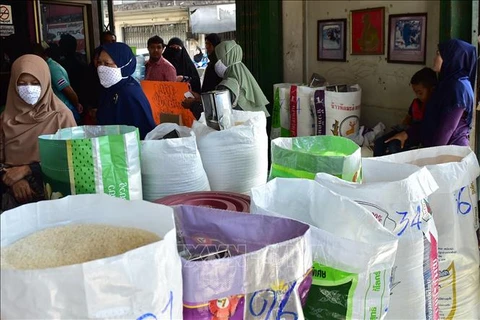Bangkok (VNA) – Thai exporters have been urged to promptly refine their export strategies given the escalating situation in the Red Sea that is affecting shipping costs and available vessel space while extending shipping duration.
Speaking after a meeting held on January 11 with the Ministry of Commerce, related agencies and shipping lines to assess the impact of the attacks on international cargo ships in the Red Sea, Chairman of the Thai National Shippers' Council Chaichan Chareonsuk said the Houthi attacks are driving up costs to ship goods to North Africa, the Middle East and the EU. The uncertainty is leading to delays in goods delivery to customers.
The International Chamber of Shipping said 20% of the world's container ships are now avoiding the Red Sea, using the much longer route around the southern tip of Africa instead.
According to Chaichan, Thai exports affected by the attacks include automotive parts bound for Saudi Arabia, North Africa and Europe, as well as car tyres, food products and electronic components headed to Europe. Thailand's exports to Europe comprise 7-8% of total shipments, making it a crucial market.
Sompol Tanadumrongsak, Managing Director of Fortune Parts Industry Plc, said shipping costs to the Red Sea have increased by 200-400%. For shipping routes to Jeddah, Saudi Arabia, Aqaba, Jordan, and Sokhna, Egypt, the cost has increased from 1,500 USD to 8,500 USD per 20-foot container. For containers bound for Turkey, the cost has risen from 2,400 USD to 7,500 USD per container. For routes to Europe, the cost has tripled compared with the previous year.
He said exporters and importers need to prepare in advance for container bookings and shipping schedules, ideally around one month ahead. If the export goods are not time-sensitive, it is advisable to wait until the first weeks of February during the Chinese New Year holiday because freight costs are expected to decrease during that period, given the rush in activity occurring in China before the holiday.
Director-General of the International Trade Promotion Department Phusit Ratanakul Sereroengrit said the Ministry of Commerce requested shipping companies maintain their freight rates as promised. He said the shipping companies have assured the ministry the pre-booked freight rates will be honored without adjustment, though this is subject to the discretion of their parent companies.
Regarding surcharge costs, the ministry asked shipping firms to make clear announcements to enable exporters to plan and negotiate with importers, said Phusit.
The ministry is sending a letter to shipping companies to communicate these concerns and request clarity on the announcement of surcharges, he said, adding that these moves can facilitate exporters and importers in their planning of business operations./.























